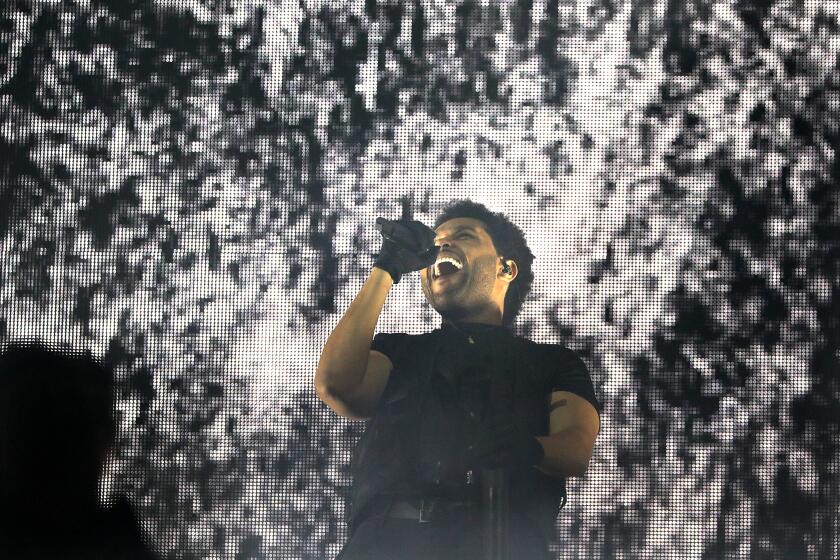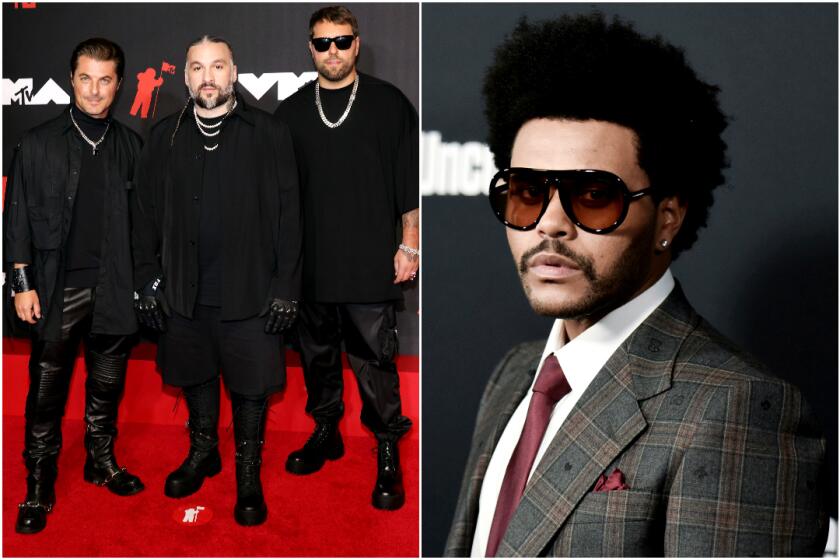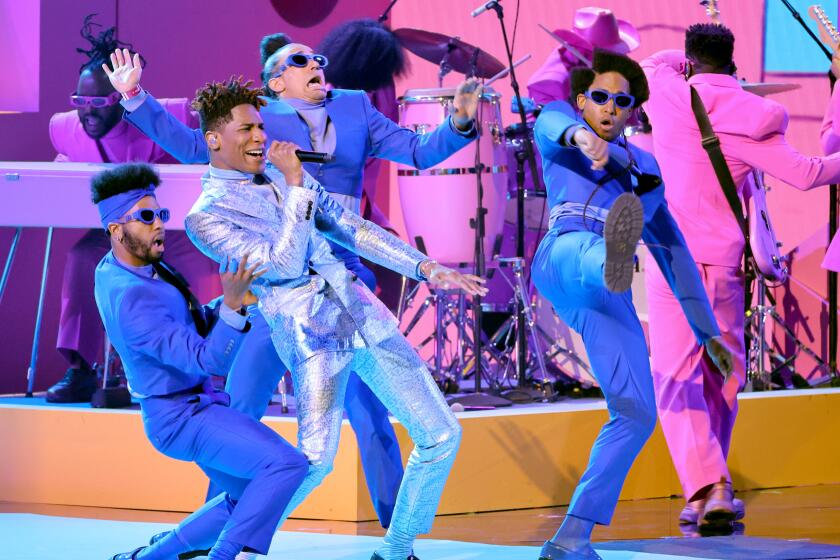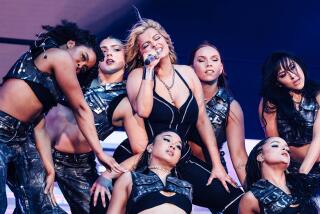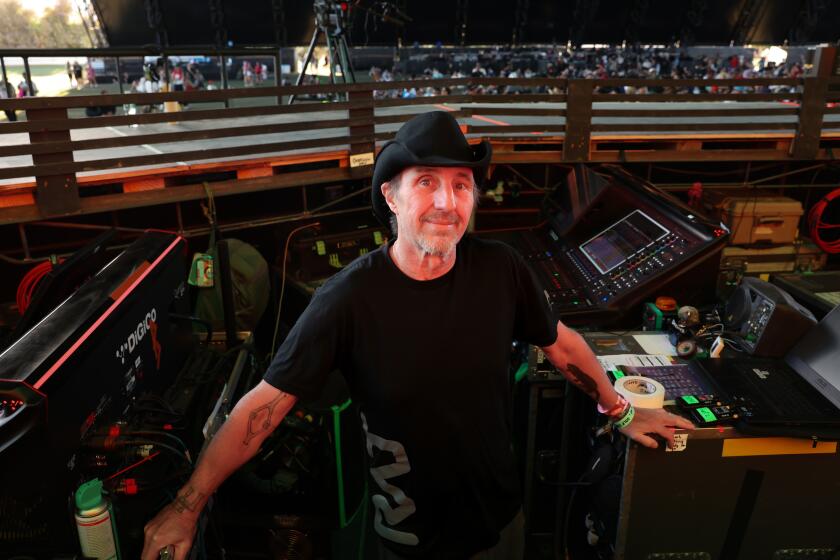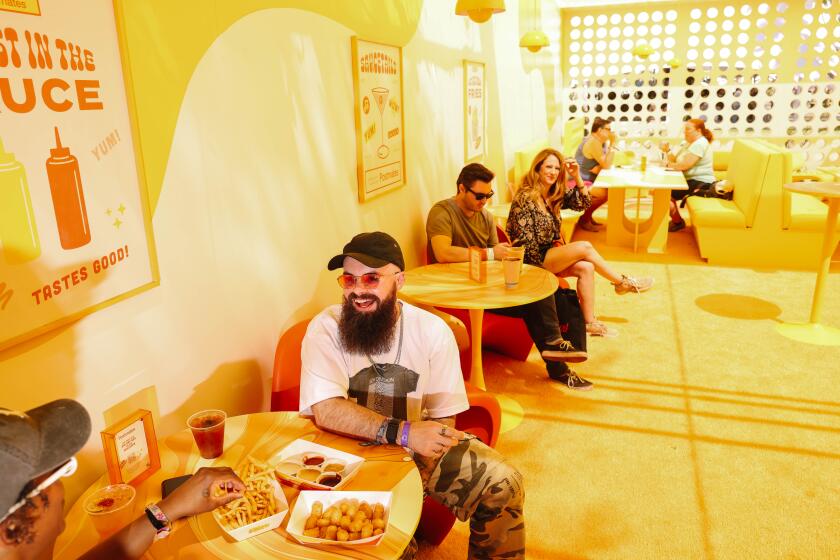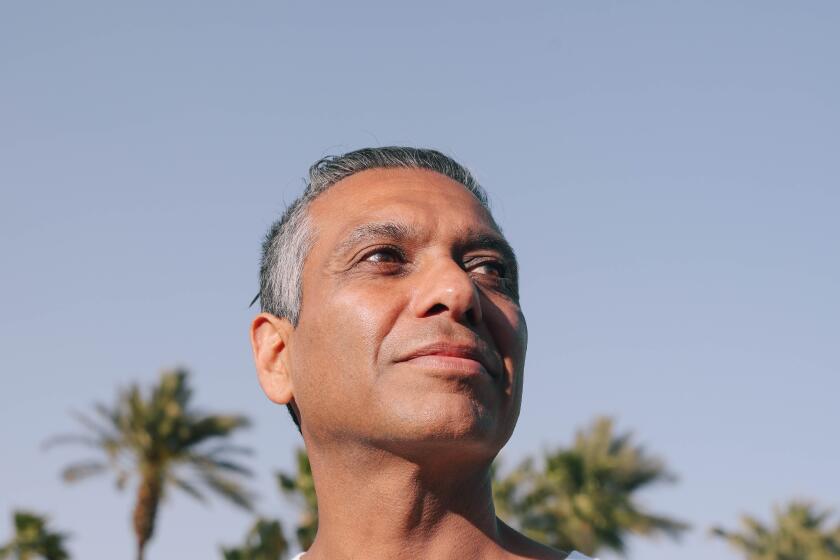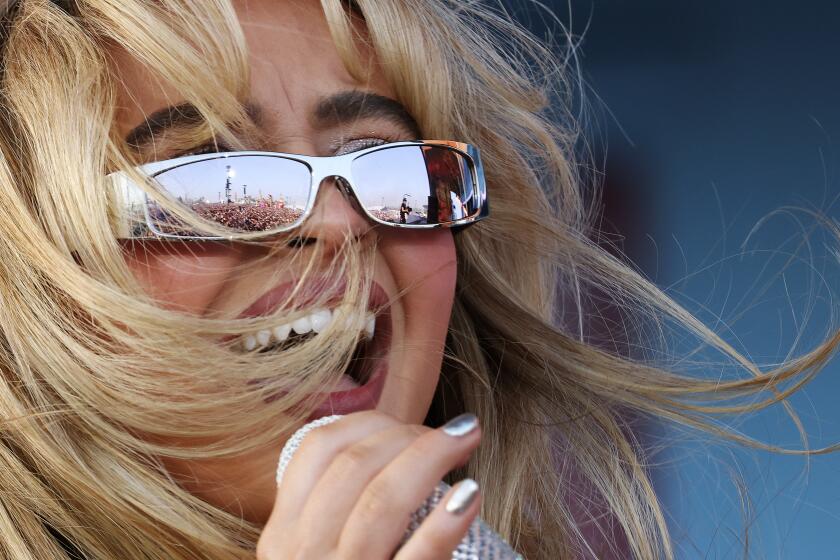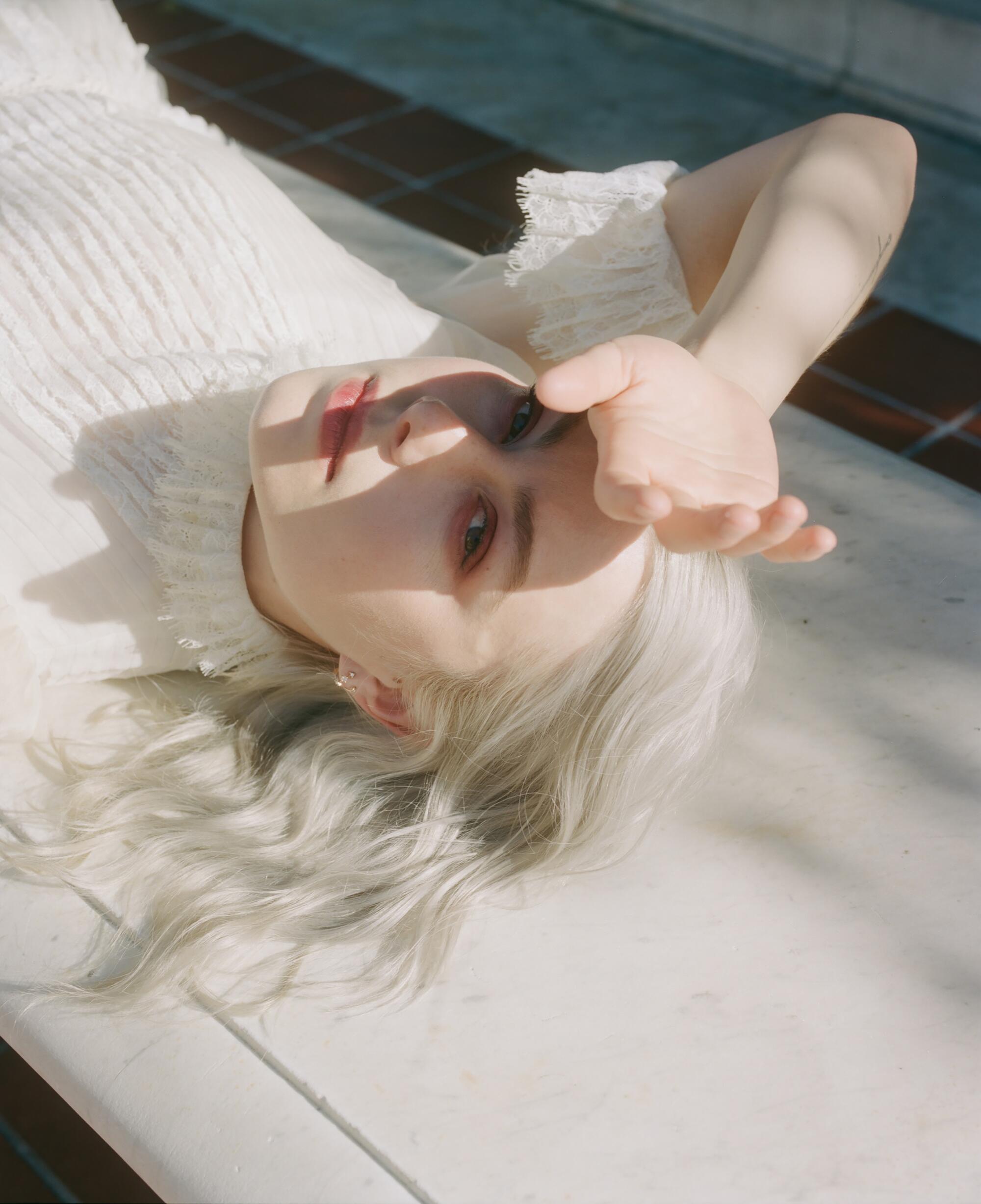
The first time Phoebe Bridgers went to Coachella — and the second and third time too — she went with her mother.
Bridgers, born and raised in Pasadena, was in high school then, a pale whisper of a punk girl who had yet to get her ears pierced. That was until one fateful Coachella in 2011, when, on a whim, she dyed her hair electric pink, then goaded her mom, Jamie, to take her to get pierced at a Claire’s at the mall in Palm Desert. She elbowed her way to the front during the Crystal Castles set, and thrashed next to singer Alice Glass in a mosh pit as her mom nodded along from the outskirts of the crowd.
“My mom had a great time,” says Bridgers, now 27. “It was so 2011. I wore these bedazzled hot pants and combat boots. My hair was dyed pink, my hands were dyed pink. I’ve been on a lot of worst-dressed lists [since], but I think it’s something I’m proud of now.”
The Times’ Mikael Wood and Suzy Exposito report live from the 2022 Coachella Valley Music and Arts Festival at the Empire Polo Club in Indio.
Bridgers will return to debut on Coachella’s main stage on Friday, this time as a four-time Grammy-nominated singer-songwriter. An intimate, folk-macabre history of emotional turmoil, her sophomore album “Punisher” — which earned her nominations in 2021 for best new artist, alternative music album, as well as rock song and rock performance for the single “Kyoto” — became a restorative, cooling balm for many upon its June 2020 release, which coincided with the COVID-19 pandemic, as well as a national uprising following the murder of George Floyd by Minneapolis police.
“I’m not pushing the record until things go back to ‘normal,’” she tweeted that day, in solidarity with protesters. “I don’t think they should.”
Since then, Bridgers achieved her first No. 1 placement on Billboard‘s emerging artists chart; in 2021, she sold out two consecutive nights at the Greek Theatre, where Olivia Rodrigo and the 1975’s Matty Healy happened to be in attendance.
She also counts a number of famous new fans, such as pop superstar Taylor Swift; English icon Elton John, who said he would “hit someone” if Bridgers didn’t win a Grammy; and Irish actor Paul Mescal, star of the TV adaptation of Sally Rooney’s novel “Normal People,” with whom Bridgers struck up a long-distance romance over Twitter in 2020. (“He’s the best” is all she’ll divulge.)
Coachella organizers have tapped EDM supergroup Swedish House Mafia and R&B star the Weeknd to co-headline the festival later this month.
We meet in Highland Park. Bridgers cradles Maxine, her small black pug, whose tongue hangs comically from the side of her mouth. During conversation, she keeps her Ray-Ban sunglasses on, which offsets her spectral visage, and wears a bespoke black Lifershop dress, printed with Frank Frazetta-esque skeletons playing guitar.
“People are always like, ‘What’s up with the skeletons?’” says Bridgers. As if a recurring handshake deal with her own imminent mortality, Bridgers has developed a reputation for wearing skeletons on her clothing — whether it’s the matching onesie pajamas she dons with her bandmates onstage or the Thom Browne suit she wore to the 2021 Grammys red carpet, emblazoned with a skeleton intricately beaded to scale.
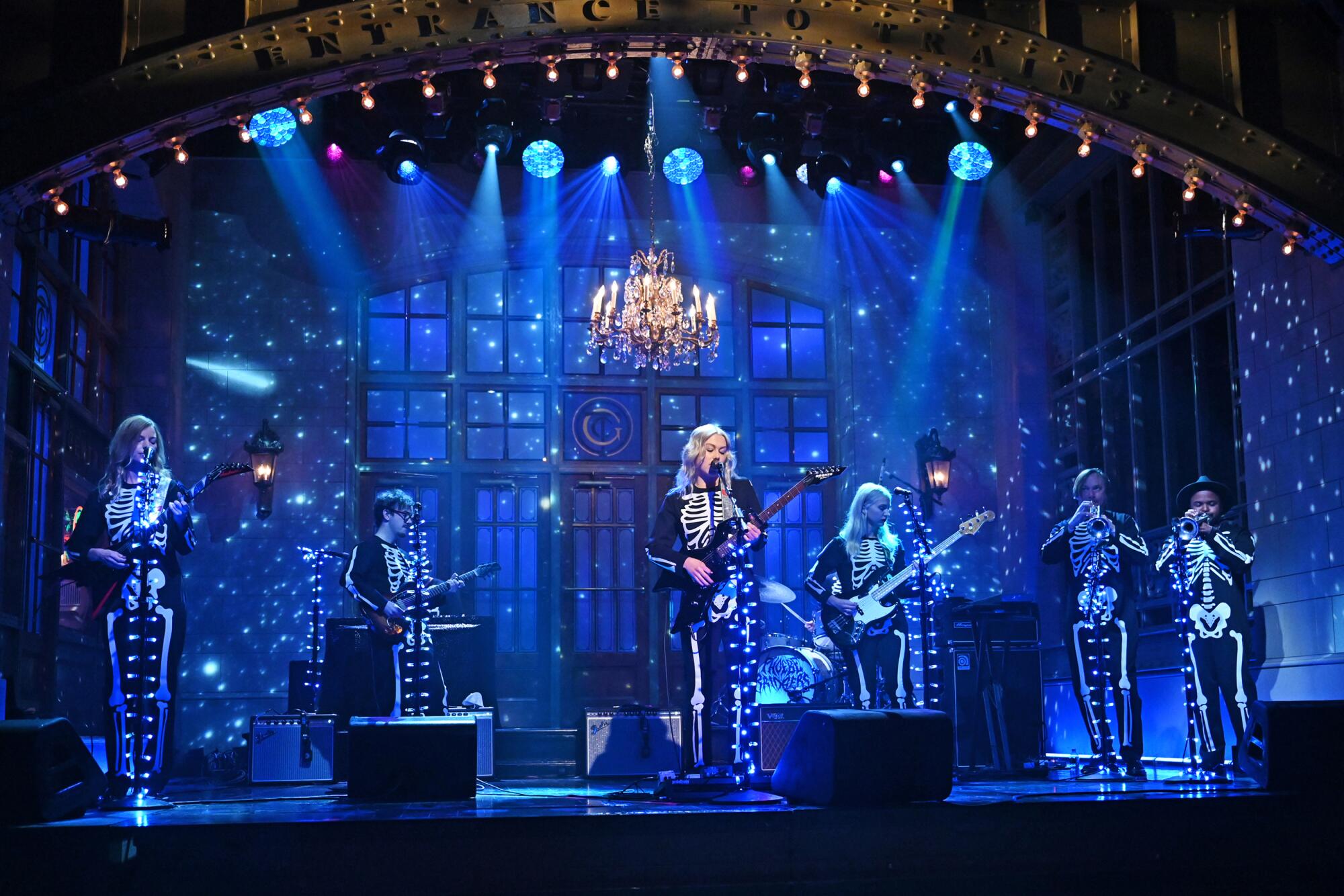
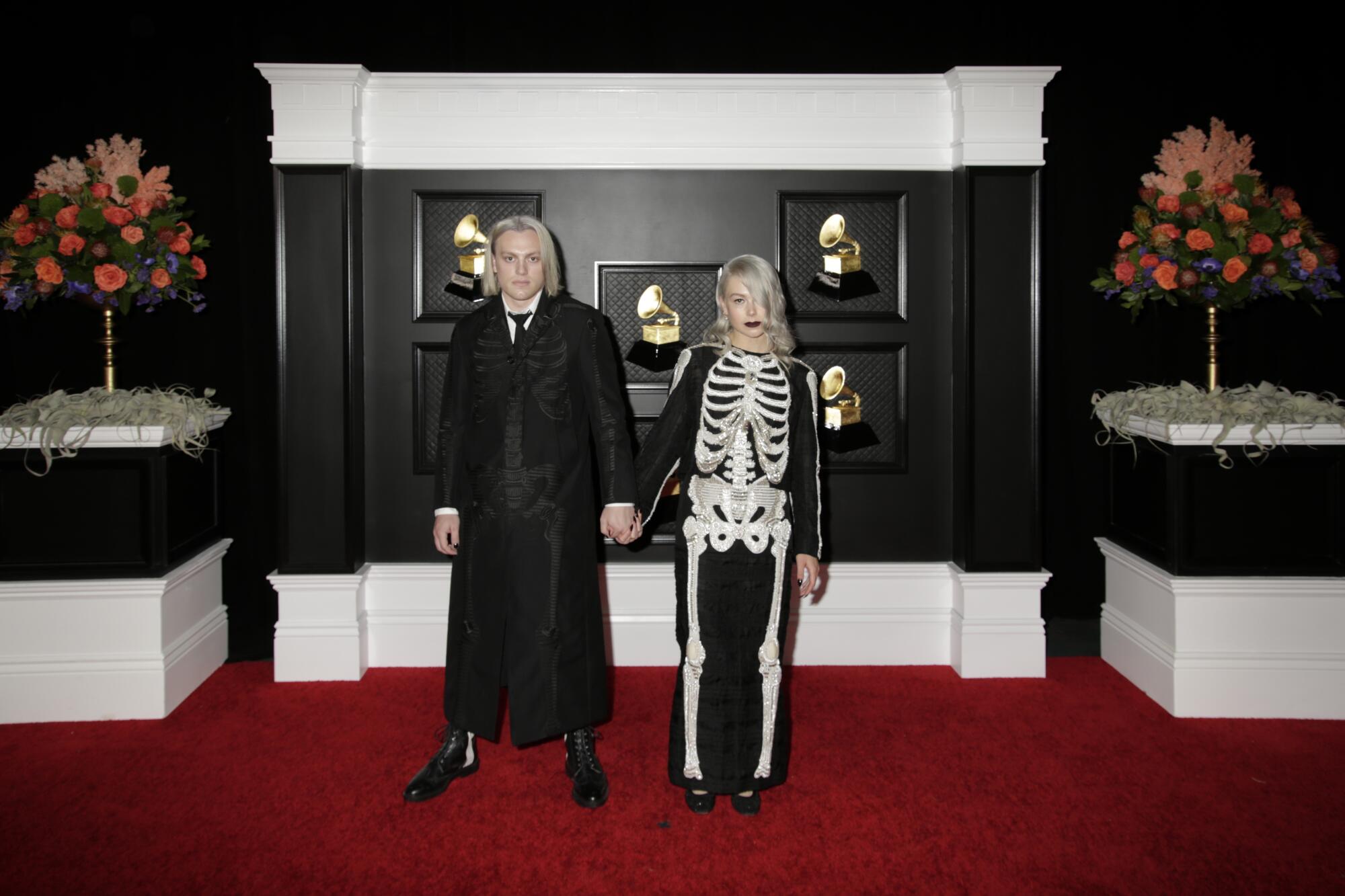
“When I finally went back on tour last year and saw like a sea of skeleton costumes, it made me want to cry,” she says. “I was like, ‘These kids get it.’”
She adds that it’s partly a byproduct of living in Los Angeles; she recalls the time she attended a Día de los Muertos celebration at the Hollywood Forever Cemetery and reveled in the music of local Latin rock legends, Ozomatli. “I learned that there can be fun in the darkness,” she says.
Born in 1994, Bridgers grew up absorbing a broad range of music inherited from her parents and their friends, who introduced her to baby boomer icons such as Neil Young and Joni Mitchell. Yet by the time she began attending the Los Angeles County High School for the Arts — a student in the vocal jazz program — Bridgers began to immerse herself in emo acts like My Chemical Romance and Bright Eyes.
Haley Dahl, singer-songwriter of the avant-rock band Sloppy Jane, took notice of Bridgers in high school, and asked her to play bass in the band. “Phoebe was wearing dresses with bicycles on them and listening to ukulele stuff,” says Dahl. “We were bored teenagers together.”
Sloppy Jane performed in backyards and underage-friendly DIY venues like The Smell. Yet when Sloppy Jane was cast for an Apple commercial, Bridgers stood in for Dahl, who had concerns about selling out. Bridgers, who was busking with an acoustic guitar at the local farmer’s market, worked additional commercials to save up for what would become her first recording.
A disciple of depressive indie rockers Elliott Smith and Bright Eyes’ Conor Oberst, Bridgers grew to be similarly grotesque and unsparing in her lyrics, issuing closely-sung, earth-scorching farewells to ex-lovers and friends from whom she’s moved on — even when she can’t outright say it to them. (“I have an avoidant attachment style,” she explains of her relationships, citing a term she learned from her therapist.)
Bridgers eschewed college at 18 to work as a full-time musician and learned quickly that to be financially resourceful was to be socially resourceful, too. On the indie rock circuit, she rubbed elbows with influential people like Tony Berg, who’d produced records for Edie Brickell and Aimee Mann, and eventually popular underground musician Ryan Adams, who compared her to Bob Dylan. Adams released her 2014 EP, “Killer,” on his boutique label PAX AM.
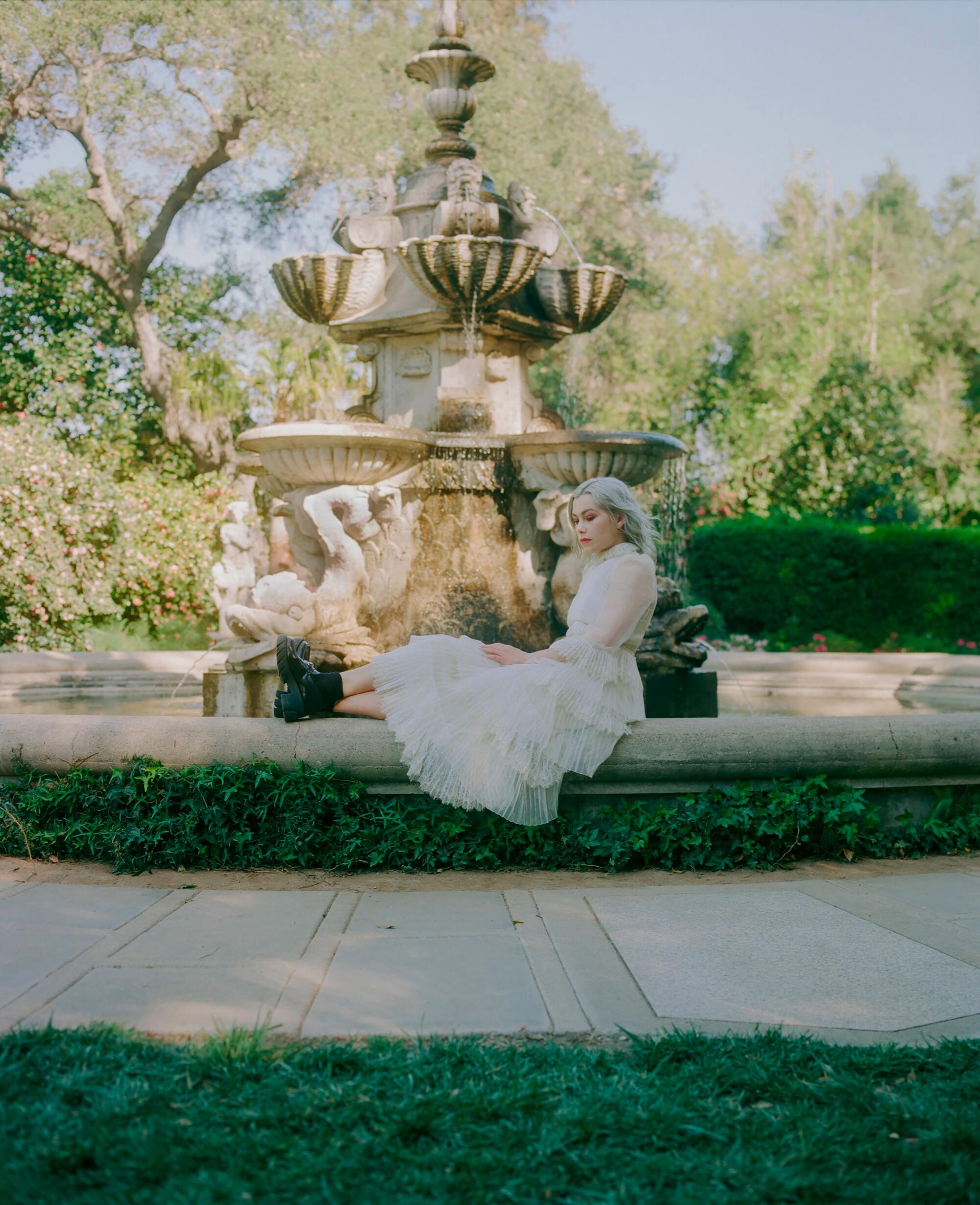
Adams also began courting her romantically, when she was 20; or, exactly half his age. In a New York Times bombshell published in 2019, Bridgers came forward, alongside singer Mandy Moore and several other women, in describing his behavior as “emotionally abusive.” (She says, looking back: “There was a collective responsibility we all had to each other ... I got messages from eight other women after that.”) Adams characterized reporting on the accusations as inaccurate; he later apologized to anyone he “ever hurt, however unintentionally.”
While she dated Adams, Bridgers’ home life was in turmoil. In a 2017 interview, she described her father’s behavior towards her mother as “textbook domestic violence.” “We went through a lot,” she tells me. The dysfunction hit a fever pitch, she says, after their house caught on fire, a fitting metaphor for the state of the family. Her parents divorced shortly after.
Bridgers eventually alluded to the incident in a shuddering duet with Oberst titled “Would You Rather” — a single off “Stranger in the Alps,” her 2017 debut on indie label Dead Oceans, which she wrote for her brother Jackson. “You were still in the ambulance / When the cop suggested you’re the one who tried to burn it down,” she sang.
Bridgers and Oberst continued to write and release folk-rock music together as Better Oblivion Community Center.
“There are very few people you meet in life that change you,” Oberst told Pitchfork in 2020. “I remember my life before I met her and after.”
Although the 2022 Grammys Awards were dominated by women and people of color, they still favored tradition with just the slightest sprinkling of modernity.
It was in 2020, after Bridgers helped broker an additional Bright Eyes deal with Dead Oceans, a subsidiary of Secretly Group, that she approached label founder Chris Swanson to start a label of her own. Upon getting the green light during the pandemic, she dubbed it — true to her Halloween-y sense of humor — Saddest Factory Records.
“I wanted to share the same good experience I had as a new artist with Secretly,” says Bridgers. “The deals I was offered before I made my first album were heinous and should be illegal. I got cast in a couple of commercials that paid for me to make an album that I could shop around, but there’s something deeply wrong about that. If I didn’t live in such close proximity to the music and TV industry, I may not have had a career.”
Bridgers has since signed high school friends Sloppy Jane and Charlie Hickey — as well as nonbinary pop artist Claud and L.A. trio Muna, who joined after their contract with major label RCA was terminated. “She’s accumulated power and attention, but she gracefully shares the stage,” says Muna vocalist Katie Gavin. “She amplifies what inspires her in other people.”
Saddest Factory held their inaugural showcase last month at the SXSW festival in Austin. As a bisexual “since forever,” she says, Bridgers felt compelled to pass the microphone not just to artists on her label, but to various LGBTQ activists and organizers fighting transphobic legislation in Texas.
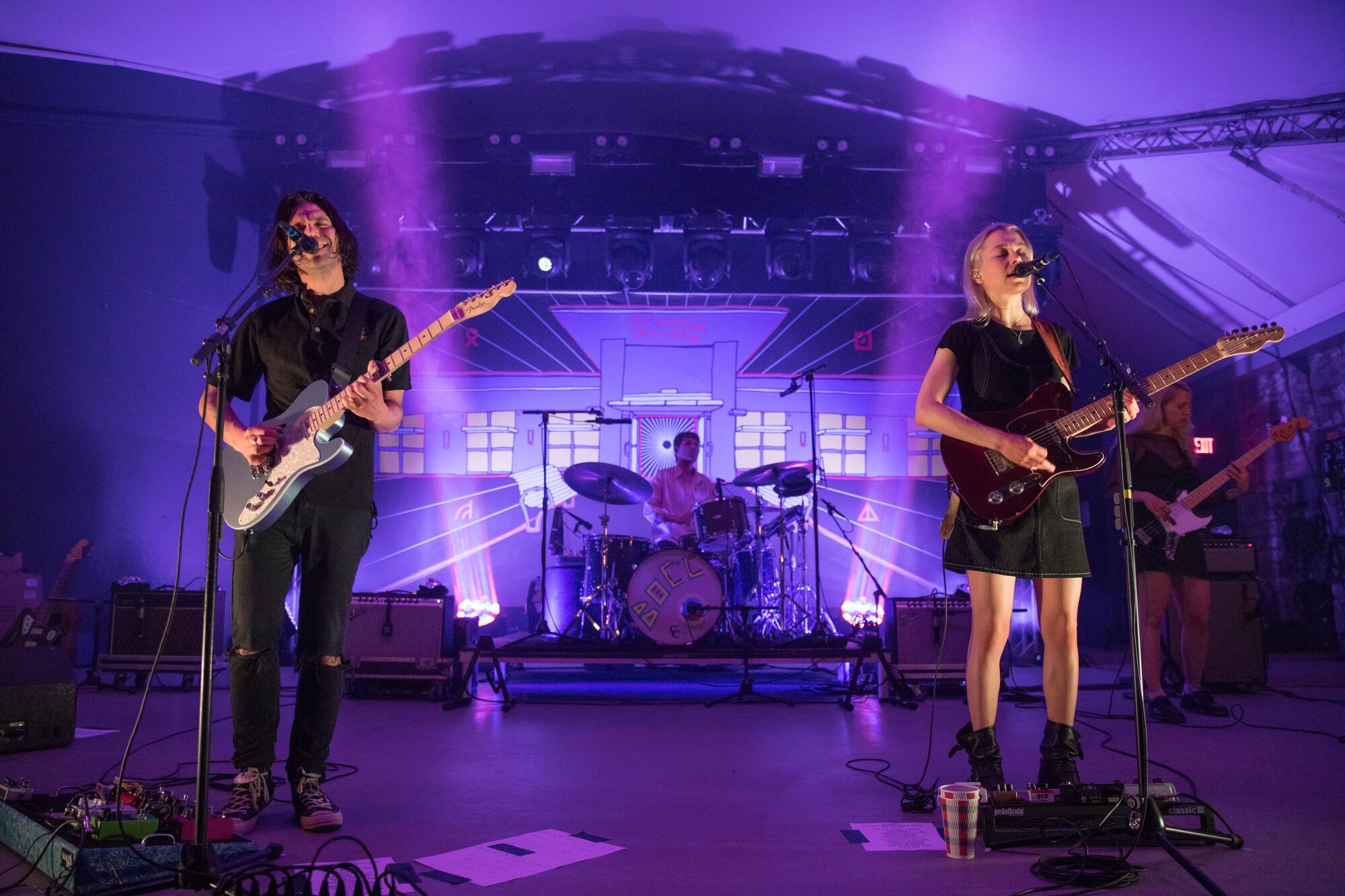
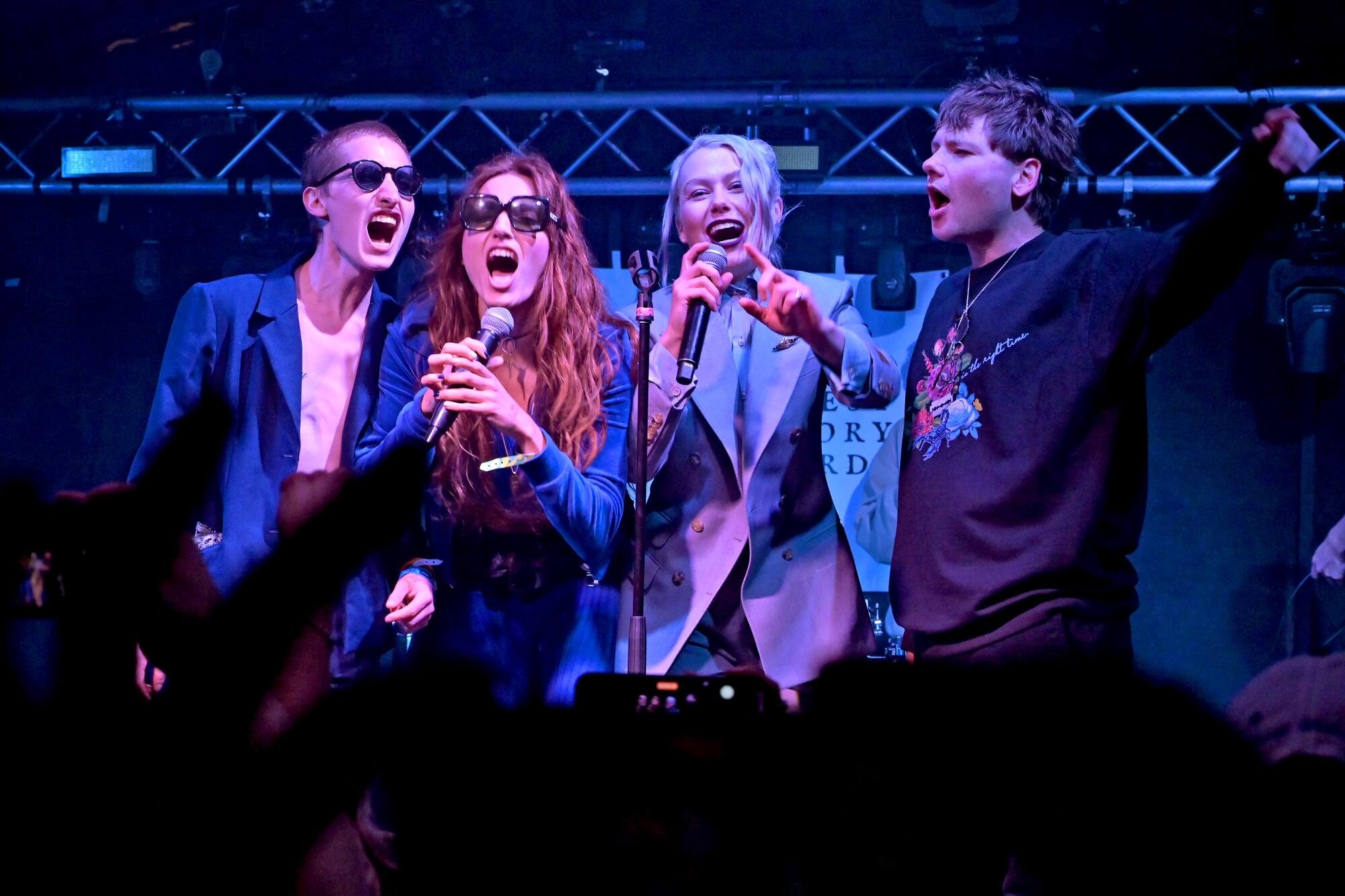
“I lean into the girl boss,” Bridgers says sardonically of her chief executive status.
It was while making music with fellow singer-songwriters like Lucy Dacus and Julien Baker, also known as the indie supergroup Boygenius, that Bridgers came to understand their survival as working artists, and as women, were intertwined.
“I watched an older generation, especially of men, f— things up while the people around me, in my scene, were all rooting for each other,” she says.
Yet Bridgers’ principles have come with a price: In October 2020, she expressed support online for her friend, Emily Bannon, who wrote a series of Instagram posts accusing her ex-boyfriend, local recording studio owner Chris Nelson, of abuse. Bridgers shared that she “witnessed and can personally verify” the claims against Nelson.
Nelson filed defamation lawsuits against both Bannon and Bridgers — claiming that he shared a consensual relationship with the women, and that Bridgers “used her high-profile public platform to disseminate false and defamatory statements” and “damage [his] reputation.” He claims to have suffered damages of no less than $3,800,000.
“Mr. Nelson is seeking to chill Ms. Bridgers’ allegations of abusive conduct, which are protected by the First Amendment,” wrote Bridgers’ attorneys in a court filing. They added that the complaint, which included private text exchanges with Bridgers, was a “transparent attempt to embarrass” her.
A Los Angeles Superior Court judge ruled that Bridgers would have to appear at a deposition before April 29, to determine whether she acted with “malice.” Reticent to discuss the suit with The Times, she says regarding its contents: “I think it’s disrespectful to report on.”
Lately Bridgers has been revisiting Sally Rooney’s first novel, “Conversations With Friends.” A fan of Rooney’s, Bridgers was invited to contribute music to the forthcoming TV adaptation, which will star Joe Alwyn and Alison Oliver. The book, she says, gave her a new perspective on her past.
“I relate to the main character, as a queer woman [who] spent her 20s just looking for someone to follow,” says Bridgers. “I am lucky to be surrounded by beautiful, loving people now... I just I had to start weeding the garden of bulls—.”
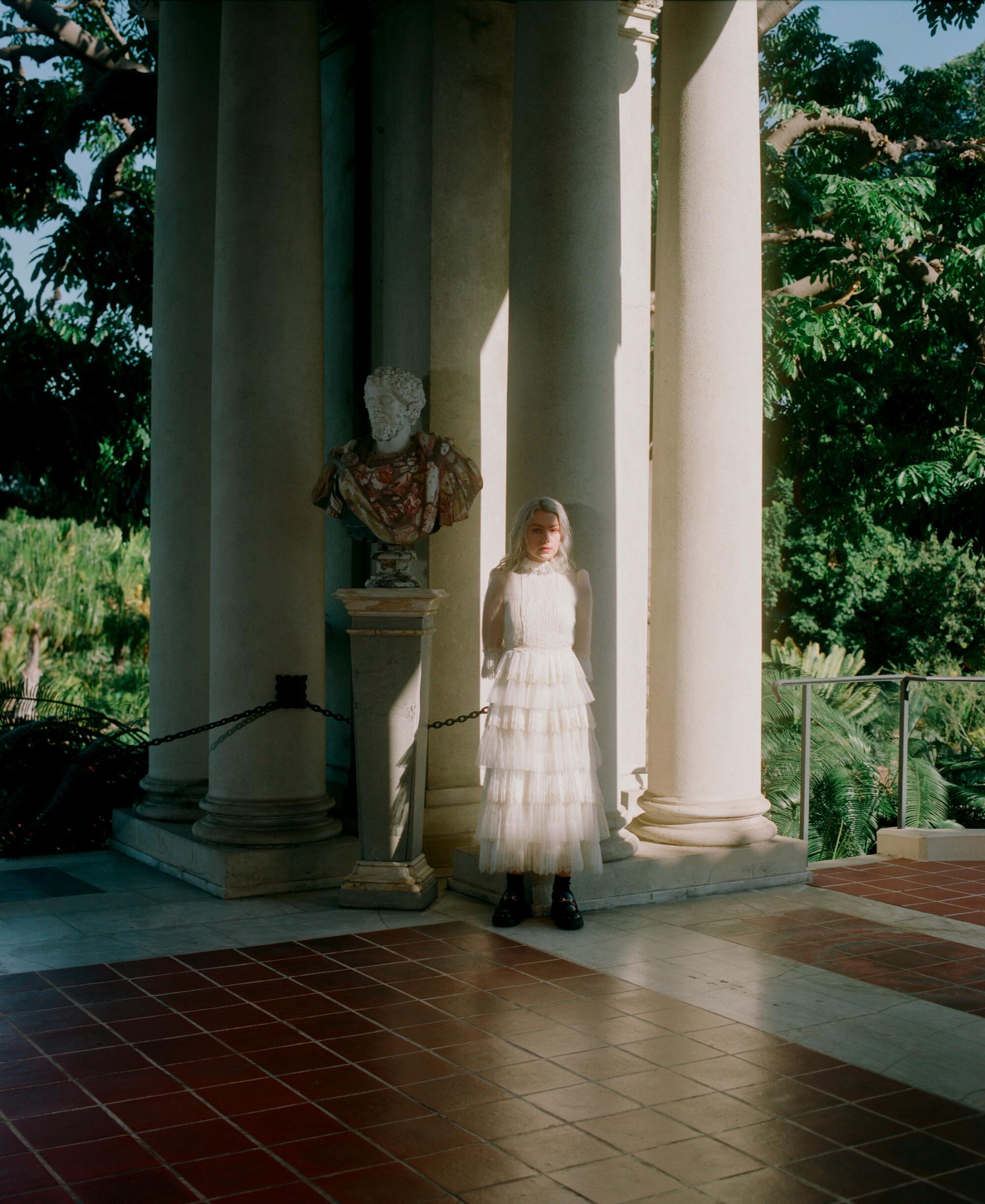
Where Bridgers was once liable to tweet overshares like “hitting the open road with six strings and a UTI,” today’s version doesn’t volunteer as much, on the internet or otherwise. She’s even had to change her cell phone number multiple times — which is why when she received a mysterious text from Taylor Swift last fall, she almost didn’t believe it.
Swift asked Bridgers to share vocals on an old folk ballad of hers titled “Nothing New” — which remained in the vault until it appeared on the 2021 “Taylor’s Version” re-record of her 2012 album “Red.” Swift recorded her vocals from the Belfast, Northern Ireland studio Kitty Committee, while Bridgers beamed in her tracks from L.A.’s Sound City; they still have yet to meet in person.
“I think that the specificity of Phoebe’s lyrics, and the vulnerability she expresses in her voice when she delivers them is what makes her music so deeply impactful and moving for me as a fan,” Swift wrote to The Times via email. “You feel like she’s reliving a precise memory or delivering a secret message to someone and you get the privilege to read it or hear about it. Her phrasing is very conversational, which turns her storytelling into something tremendously intimate, fragile and real.”
“The specificity of Phoebe’s lyrics, and the vulnerability she expresses in her voice when she delivers them, is what makes her music so deeply impactful and moving for me as a fan.”
— Taylor Swift
“Nothing New” came to Swift when she was just 22; in a 2012 diary entry, she described the song as “being scared of aging and things changing and losing what you have.”
“[The lyrics] hit me more than I thought it would,” says Bridgers. Like Swift, she began her career as a talented teen in a music industry that often exploits young women, whether as artists or fans. “I was a lot more worried about my youth and getting discarded when I was 21. At that age, everybody writes about you as like a prodigy.
“To have won [Swift’s] trust was special — I knew there was a reason she thought of me,” she continues. “I was stressed and I wanted to get it right, but she was a great guide to me and approached everything with such care.”
With Coachella one week away, followed by her much-delayed summer tour for “Punisher,” which kicks off in May, Bridgers hints that she’s got some tricks up her skeleton-print sleeve. But she’s most excited to check out sets by fellow indie eccentrics such as Arlo Parks, Caroline Polachek and 100 Gecs; she’s also happy to get her mom and her brother all-access passes this go-around.
“I play on Friday,” she notes. “Which means I don’t have to worry about getting sunburned until after my set.”
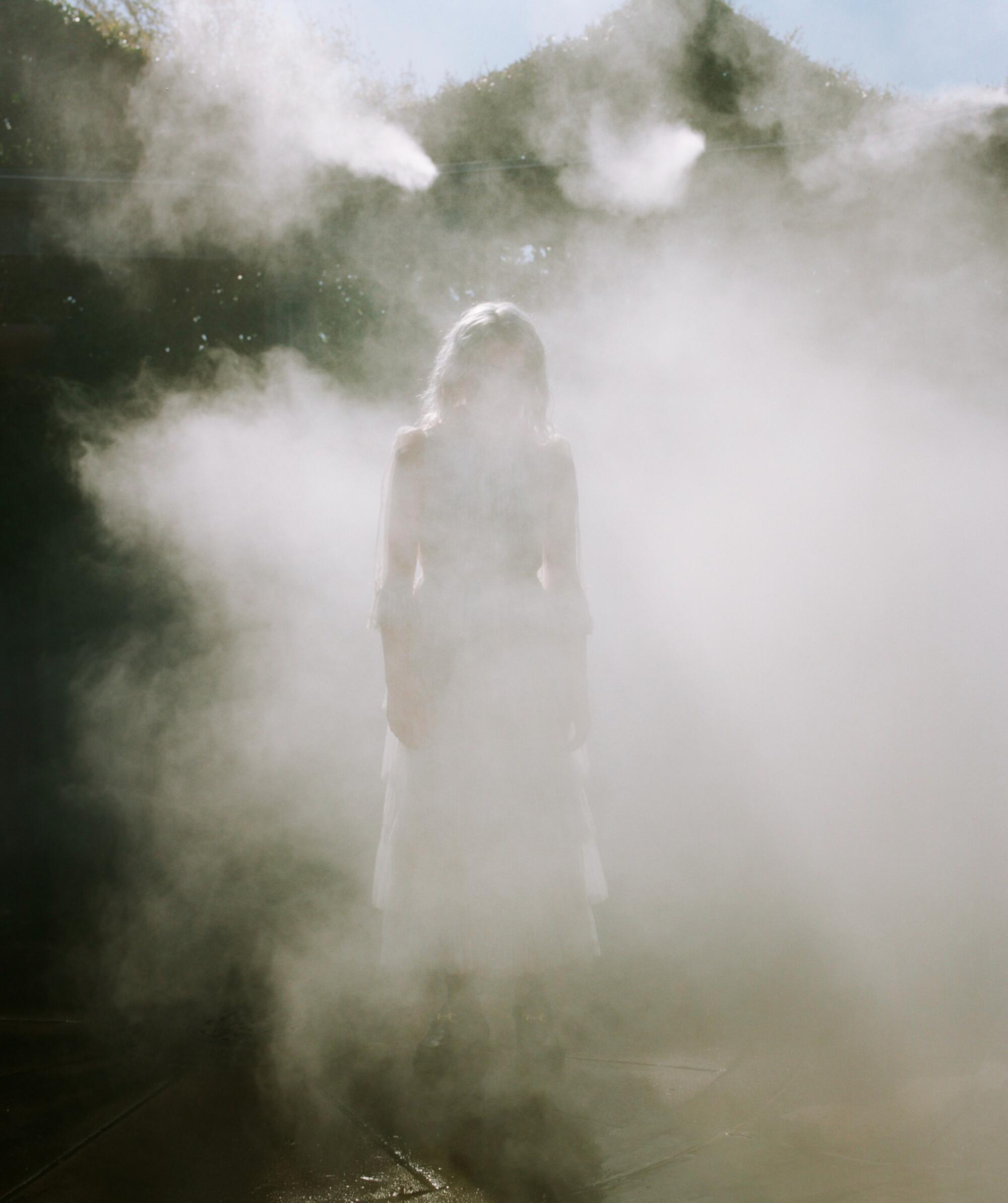
More to Read
The biggest entertainment stories
Get our big stories about Hollywood, film, television, music, arts, culture and more right in your inbox as soon as they publish.
You may occasionally receive promotional content from the Los Angeles Times.
